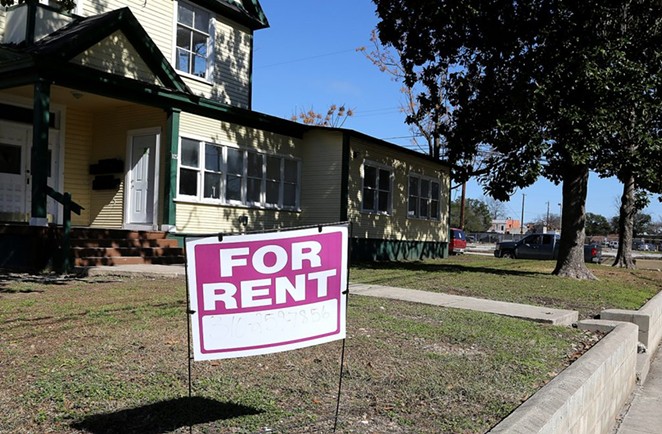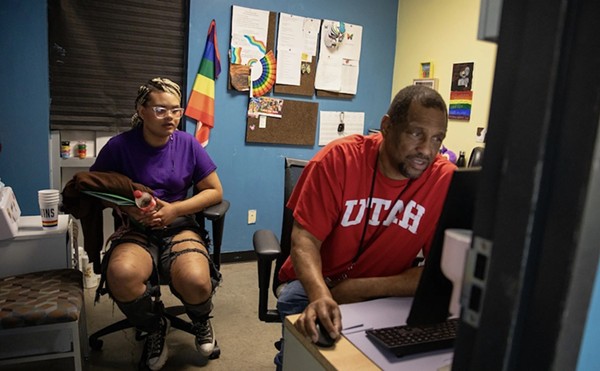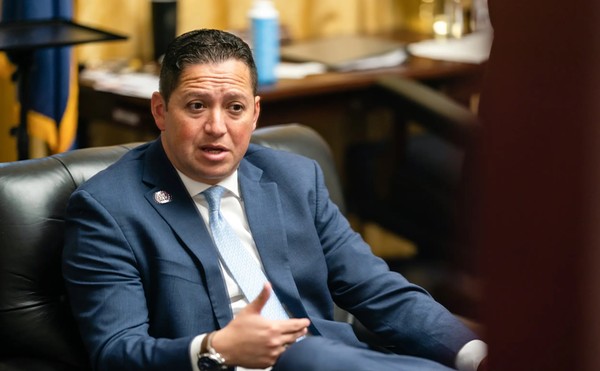
Under the proposed ordinance, landlords could not begin the eviction process until early July, roughly two months after the Texas Supreme Court’s eviction moratorium ends. District 1 Councilman Roberto Treviño, who’s spearheading the local statute, says people who have lost their jobs or hours during the coronavirus outbreak need extra time to clear any debt they may owe their landlord. In San Antonio, 47% of residents rent, according to U.S. Census data pulled by Treviño’s staff.
“People need a chance to get back on their feet,” Treviño said last week. “Everybody does. What we’re reviewing now is language that helps provide a grace period. As people get back on their feet, they can pay their rent …
“We’re getting to a tipping point where our social services and safety nets are not going to be able to handle something like this. We are asking for clarity, asking for people to be compassionate, and find a framework that keeps people in their homes.”
Some apartment advocates say Treviño’s crafting a remedy for a problem that doesn’t exist. Most landlords are working with tenants to reduce rent or enter payment plans, they say. The proof, they say, is the fact that eviction filings have come to a near halt—two months ago, in the second week of February, there were 542 eviction lawsuits filed in Bexar County; last week, there were 12.
Even with Justice of the Peace eviction courts currently suspended until April 30, landlords can still file lawsuits—they just won’t be heard by a judge until after May 1, under current conditions.
Treviño said his measure is preventative, especially given the fact that current models predict San Antonio will reach its peak in coronavirus cases in mid-May.
“God forbid there comes a point when we are really in need (of extra time) and we could have done something and we didn’t,” Treviño said Wednesday.
Last week, City Attorney Andy Segovia told the city council his staff is reviewing similar ordinances statewide, including one in Austin. He said when it comes to Texas property law, “municipalities are very, very limited. You have to get express permission from the state.”
Here’s how Treviño’s ordinance would work:
Normally, a landlord posts a “notice to vacate,” the first step in the eviction process that signals to the tenant an eviction lawsuit is imminent. Treviño wants to require landlords to post “notices of proposed eviction,” which would give tenants a heads up that the landlord intends to evict—at the same time granting renters until early July, or roughly 60 days from the end of the Texas Supreme Court’s eviction moratorium, to settle their debt.
In other words, a “notice of proposed eviction” would pause a landlord’s ability to begin the eviction process.
Treviño fears people may receive “notices to vacate” thinking they have to leave the premises—which they don’t. It’s only after they go to eviction court, should they lose their case, that a judge issues a “writ of possession,” the legal taking back of the property.
Also, in Treviño’s draft, he states the extra 60 days does not excuse a tenant from what they owe.
Marc Ross, who co-owns Bob Ross Realty, which controls 700 apartment units in San Antonio, says the majority of apartment owners he’s talked with in recent weeks have not issued notices to vacate, except in extreme cases such as those that involve criminal activity.
Treviño said his office has been fielding calls from renters who say otherwise.
Ross said he and other landlords are worried Treviño’s plan will discourage people from paying rent the next three months, leaving property owners in dire financial situations of their own.

Treviño disagrees.
“Nobody’s using this as an excuse,” the councilman said. “Everybody is suffering. We all know it. The fact is, we have a very serious crisis on our hands, and I’m just simply trying to be proactive about it.”
Other efforts
Treviño’s proposed ordinance comes at a time when the number of Texans filing for unemployment has skyrocketed. In San Antonio, local officials have been scrambling to augment funding for its housing assistance program, which the council created two years ago to combat gentrification. Now the program is helping renters stay place by paying back rent, fees and other livings expenses they cannot cover during the crisis. There’s a little more than $1 million in the fund, also known as the risk mitigation fund.
Bexar County The San Antonio Apartment Association has urged its members, which represents 160,000 units in the city, to forgive 25% rent for those who receive assistance from the city—either for rent or the mortgage. The gesture has been lauded by city officials as a means of stretching the city’s limited funds.
[ Anyone can donate to the risk mitigation fund. To donate, visit helpsatx.org and indicate you want to support the “risk mitigation fund.” ]
Overall, city officials have identified $14.2 million, including the $1 million in its own housing assistance program, to help keep San Antonians in place during the pandemic. Some of those dollars will come from the CARES Act, the coronavirus aid package Congress passed in late March.
It’s unclear whether the ordinance will come from the City Council or ultimately from Bexar County—or whether it will be approved at all. At its regular meeting Thursday, the council is expected to discuss the measure, which would begin May 8, the day after the Texas Supreme Court’s moratorium on “writs of possession” ends. Treviño’s grace period would last for 60 days after that.
In addition to suspending eviction court until April 30, Bexar County has also suspended property tax foreclosure sales for April and May.
‘We are working deals right and left’
Ross says his company, and the others he’s talked to during the crisis, has worked with tenants on payment plans. If a renter is receiving unemployment benefits, they should meet the obligation of the lease by sending some of those funds to the landlord, he says.
“As people are receiving money, we need to get paid,” Ross said. “Nobody wins by having a bunch of vacant places … When you get your unemployment check, we want 50% of your unemployment check a week.”
Ross said his company will work with tenants who cannot get through the jammed Texas Workforce Commission phone lines.
“Those people we’re working with,” he said. “None of those people are getting notices to vacate. Everybody gets what’s going on.”
Ross is afraid of people will abuse Treviño’s ordinance.
“The only people we are going to issue a notice (to vacate) … it’s going to be somebody who has a job who is basically thumbing their nose at us,” he said. “Anybody who has had their hours cut or been fired … Covid-19 related, we are working deals right and left.”
“We don’t want vacate units,” he said. “But we don’t want people who can afford to pay thumbing their nose at us, saying I’m not paying and there’s nothing you can do about it.”
In response, Treviño said, “A 60-day grace period to give people an opportunity to pay their rent—it makes everybody whole. I think it’s the right course of action for landlords, for renters, for everybody.”
The San Antonio Heron is a nonprofit news organization dedicated to informing its readers about the changes to downtown and the surrounding communities.
Stay on top of San Antonio news and views. Sign up for our Weekly Headlines Newsletter.


















